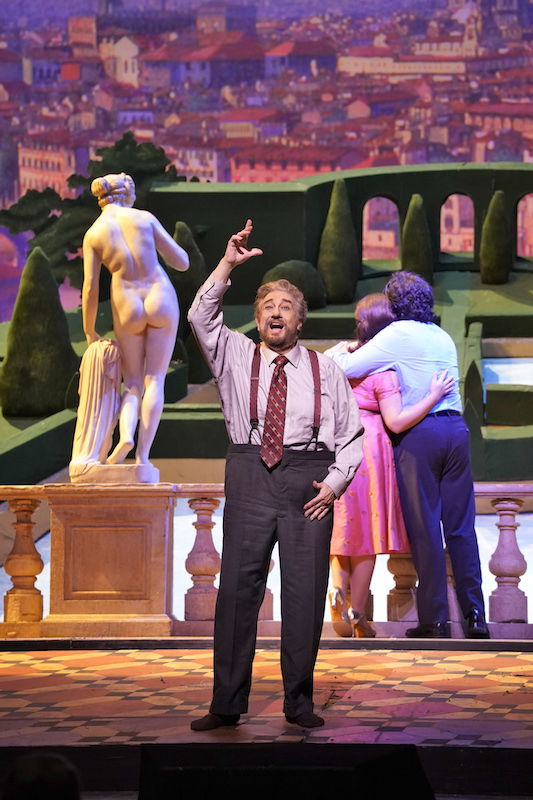Met marks two company anniversaries with Puccini’s “Trittico”

Placido Domingo stars in “Gianni Schicchi” in the Metropolitan Opera production of Puccini’s “Il Trittico.” Photo: Ken Howard
As if a comedy/tragedy double-feature weren’t enough, Puccini’s Il Trittico offers three strange bedfellows: a down-by-the-docks crime of passion, a devotion drama in a convent, and finally a farce about an infamous trusts and estates lawyer.
Monday’s performance at the Metropolitan Opera, the second in a seven-show run marking 100 years since the company gave the triptych’s world premiere, leaned into that incongruity, offering an entertaining, if perhaps inevitably disjointed evening.
The 2007 production by Broadway legend Jack O’Brien does not try to make a coherent whole of the three one-acts, wisely letting each stand as a separate vignette. Il Tabarro, the only one of the three left more or less in its original time period, opens at a gritty industrial dockyard on the Seine at sundown and ends at midnight—following the gradual heightening of dramatic tension as the barge-captain Michele learns of his wife’s affair with a young deckhand.
Musically, the first of the three operas was a little rough in Monday’s performance. George Gagnidze, though menacing as ever, initially sounded dry as Michele, warming up at last in a harrowing delivery of his chilling monologue “Nulla! Silenzio!,” as he finally lost control of his slow-burning malice. Marcelo Álvarez showed plenty of power as his rival Luigi but not much color in his tone, pushing for volume in the early aria “Hai ben ragione.” Amber Wagner, playing Michele’s wife Giorgetta in this revival, was the most solid of the three leads, showing focused, caramel sound, yet she tended towards blocky gestures in her phrasing.
The standout here was Maurizio Muraro, whose warm blanket of a bass was a luxury in the role of Talpa. MaryAnn McCormick was a bit on the soft side but offered a solid tone and dusky color as Frugola. Tony Stevenson sounded especially bright as Tinca, and Ashley Emerson brought her reliably light and flexible soprano as one of the young lovers, opposite the heavier-sounding Yi Li.
The other two operas are also moved to the twentieth century in O’Brien’s stagings, though the change isn’t immediately obvious in much of Suor Angelica, set as it is in a convent. Lighting, a key element in the staging of Il Tabarro, is even more prominent here: the designs by Jules Fisher and Peggy Eisenhauer are stunning, showing the transition from twilight to dusk in the soft change of blues and purples coloring the abbey courtyard.
Kristine Opolais, who leads the cast in the title role, has taken a step back artistically since her star performances at the Met several years ago. Most of the color, sadly, is now gone from her voice, and she is tight in her upper register. What she can still offer is truthful dramatic portrayal, which made her Angelica compelling, even if not musically so. “Senza mamma,” her invocation of her illegitimate son, was moving in the Monday performance, even showing more vocal warmth than she managed in the rest of the part.
Stephanie Blythe’s performance as the princess, Angelica’s hard-hearted aunt, was marvelous, and surprisingly subtle: the steely resolve she brought on stage with her melted just enough to be noticeable when encountered with Angelica’s emotional pleas. Blythe’s booming mezzo-soprano remains one of the most powerful instruments on the planet, enormous and colorful. She lacks flexibility, her voice breaking here and there, but her sound instantly commands attention—few are the singers who can drown out the pit orchestra in their middle range.
Among the other sisters of Angelica’s order, Lindsay Ammann stood out as the Abbess for her burning, taut contralto, and Leah Hawkins showed a full, misty mezzo as the first Alms Collector. Maureen McKay chirped sweetly as Sister Genovieffa while Megan Marino brought fluttering warmth as the Nursing Sister. MaryAnn McCormick felt more at home here as the Monitor, living in the dark, robust middle range of her voice.
The key problem of Il Trittico is the length of all three operas together—it was 10:30 before the curtain rose on Gianni Schicchi, and in spite of some fine performances there wasn’t enough energy left to make the legal farce pop.
That said, the staging of Gianni Schicchi is visually the most lively of the three, presenting the opulent bedroom of the just-deceased Sgr. Buoso, but skewed around the edges, showing perspectives that hint playfully at cubism. A shameless commitment to the piece’s whimsical slapstick humor helps to make the final reveal, a painted backdrop of the Florentine skyline, feel a little less cheesy.
As well as being a centenary for Il Trittico itself, this run marks the 50th anniversary of Plácido Domingo’s Met debut (he was reportedly feted in an entr’acte ceremony at the Friday premiere). Domingo’s victory lap as a baritone in the last few years has produced some memorable performances; his turn as the scheming estates attorney immortalized by Dante in the Inferno is not among them. In Monday’s performance Domingo sounded tired, and he is no longer spry enough to carry a portrayal on the strength of his comic verve alone.
Gianni Schicchi is at its heart an ensemble piece, with a gaggle of misers clawing at each other over Buoso’s will. Atalla Ayan, Monday’s Rinuccio, was announced as having a cold, but seemed to suffer little, bringing a rich tenor in his ringing paean to Florence, “Firenze è come un albero fiorito.” As Schicchi’s daughter Lauretta, Kristina Mkhitaryan (who made her debut in the role in Friday’s premiere) impressed with her full soprano and shapely account of the famous aria “O mio babbino caro”; it’s easy to forget, out of context, that this celebrated melody is in fact a devious little plea to win her father over to the scheme, and Mkhitaryan’s reading, tender but not overly sentimental, perfectly balanced sumptuous music with comedic effect.
Blythe returned to show off her substantial comic chops as Zita, and Muraro did likewise as the deliciously petty Simone. Tony Stevenson brought a more wheedling tone as Gherardo, and Gabriella Reyes showed a fine, light soprano as Nella. Kevin Burdette showed off superb comic instincts as Dr. Spinelloccio, while Philip Cokorinos brought his solid, woody bass-baritone as the notary Amantio.
Gianni Schicchi showed the only real weaknesses in Bertrand de Billyś conducting, as he lost control of the ensemble during some of the comic patter bouncing around among the cast. Otherwise, his readings on Monday night were vivid, emphasizing the drama of Il Tabarro with stark gestures and luxuriating in the rich lyricism of Suor Angelica.
Il Trittico runs through December 15 at the Metropolitan Opera. The December 12 performance features Tatiana Melnychenko as Giorgetta, Lucio Gallo as Michele, and Elena Stikhina as Suor Angelica. metopera.org



Posted Dec 13, 2018 at 11:08 am by DorothyT
In her Met debut and only appearance as Sister Angelica in the current El Trittico production at the Met last night, Elena Stikhina triumphed.
Magical. A star was born.